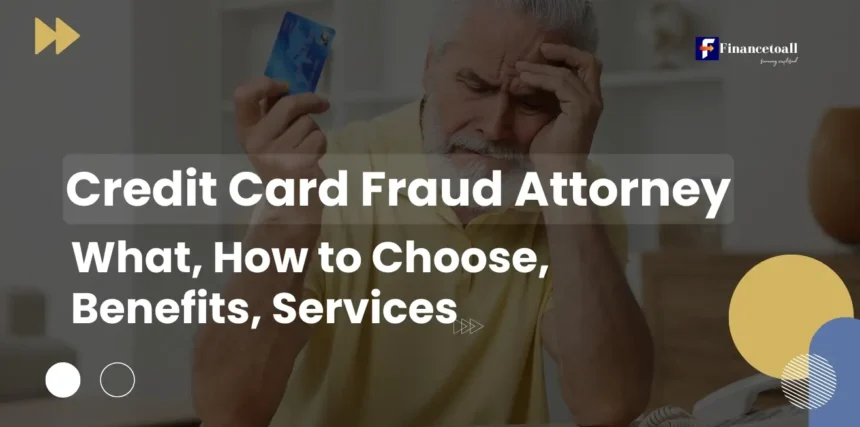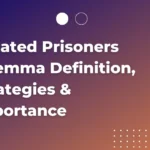Experienced Credit Card Fraud Attorney | Protect Your Rights
When facing credit card fraud allegations, having a trusted Credit Card Fraud Attorney by your side is crucial. These charges can carry severe penalties, including fines, restitution, and even imprisonment. An experienced attorney understands the complexities of fraud cases and can provide a strong defence According to your Situation.
Credit Card Fraud: A Growing Concern
Every year, millions of individuals fall victim to credit card fraud, resulting in billions of dollars in losses. According to recent studies, cases of credit card fraud have risen dramatically, with nearly 50% of all Americans experiencing some form of financial fraud in their lifetime. The emotional and financial toll of these incidents makes understanding and addressing credit card fraud more important than ever.
What is Credit Card Fraud?
Credit card fraud occurs when someone uses your credit card or card information without your authorization. This may involve stolen physical cards, hacked online accounts, or deceptive schemes aimed at accessing your sensitive data. For those accused of fraud, the legal consequences can be severe, ranging from hefty fines to potential imprisonment.
Navigating these challenges—whether as a victim or defendant—requires a nuanced understanding of the law, which is where a skilled attorney becomes invaluable.
Why This Guide is Important
This article will provide you with a complete roadmap for addressing credit card fraud. You’ll learn:
- When and why you should hire a credit card fraud attorney.
- How attorneys can protect your rights and recover your losses.
- Practical steps for selecting the best legal representation.
What is Credit Card Fraud?
Definition of Credit Card Fraud
Credit card fraud is the unauthorized use of someone’s credit card or credit card information to make purchases, withdraw funds, or commit other financial crimes. This type of fraud often occurs without the cardholder’s knowledge, leaving them with unexpected charges, financial loss, or damaged credit.
Common Types of Credit Card Fraud
- Unauthorized Charges This occurs when someone uses your credit card details without permission to make purchases or withdraw cash. For example, noticing unfamiliar transactions on your statement might signal unauthorized activity.
- Stolen Credit Card Information Criminals can steal your credit card information physically (from lost or stolen cards) or digitally (through phishing scams or data breaches). Once they have your details, they can clone the card or use the information for online transactions.
- Identity Theft Identity thieves use your personal information to open new credit accounts in your name or gain access to existing accounts. This type of fraud can cause long-term harm to your credit score and financial reputation.
- Card-Not-Present (CNP) Fraud In this type of fraud, no physical card is required. Cybercriminals use stolen card numbers to make online or over-the-phone purchases, bypassing security measures.
Real-Life Examples
- Example 1: Unauthorized Charges Jane received her credit card statement and noticed charges from a store she never visited. After investigation, she discovered her card details were stolen during a previous online transaction.
- Example 2: Identity Theft John’s identity was stolen through a phishing email, leading to multiple credit cards being opened in his name. He was unaware until collection agencies began calling.
The Importance of Addressing Credit Card Fraud Quickly
Ignoring credit card fraud can lead to escalating financial losses, mounting debt, and lasting damage to your credit score. Swift action ensures:
- You minimize financial damage.
- Fraudulent accounts are shut down immediately.
- Your credit score and financial standing are protected.
- Law enforcement and financial institutions have timely information to investigate.
By understanding the types of fraud and their implications, you can take proactive steps to detect and address these threats before they spiral out of control.
When to Hire a Credit Card Fraud Attorney
Signs You Need a Credit Card Fraud Attorney
Knowing when to involve a credit card fraud attorney can make a significant difference in the outcome of your case. Here are the most common scenarios where legal representation is essential:
- Facing Criminal Charges If you are accused of committing credit card fraud, hiring an attorney is critical. Even false accusations can result in severe legal consequences, including fines, a criminal record, or imprisonment. An experienced lawyer can help you build a strong defense, challenge the evidence, and protect your rights.
- Victim of Credit Card Fraud If your credit card has been used fraudulently, or your identity has been stolen, you may need an attorney to recover your financial losses and deal with disputes with banks or creditors. A lawyer can also help you navigate the legal process if the fraud involves criminal activity.
- Disputes Over Fraudulent Charges Sometimes, credit card companies or merchants may refuse to acknowledge fraudulent charges. If you’ve exhausted your options with customer service or disputes departments, an attorney can escalate the matter legally to recover your money.
- Suspected Identity Theft Identity theft often involves more than just unauthorized credit card use. Thieves may open new credit lines, take out loans, or commit crimes in your name. An attorney can assist in restoring your identity and ensuring that all fraudulent activity is addressed.
- Complex Cases Involving Financial Institutions If fraud involves multiple accounts, high-value transactions, or institutional errors, an attorney can help you navigate the complexity of these cases and secure the best outcome.
Benefits of Hiring a Credit Card Fraud Attorney
- Legal Expertise: An attorney understands the laws surrounding financial crimes and can guide you through your options.
- Efficient Resolution: With professional representation, you can resolve disputes faster and more effectively.
- Financial Protection: A lawyer can help minimize financial losses by ensuring fraudulent charges are reversed or damages are recovered.
- Peace of Mind: Knowing you have an expert on your side reduces stress and allows you to focus on rebuilding your financial security.
Act Quickly to Protect Yourself
If you recognize any of these situations in your life, it’s time to consult a credit card fraud attorney. The sooner you act, the better your chances of resolving the issue, protecting your financial health, and avoiding legal complications.
Services Offered by a Credit Card Fraud Attorney
A credit card fraud attorney provides specialized legal services to help clients navigate the complexities of financial fraud cases. Whether you’re a victim or facing allegations, their expertise can make a significant difference in protecting your rights and resolving the situation.
For Defendants: Legal Defense Against Credit Card Fraud Charges
If you are accused of credit card fraud, an attorney can offer several essential services to protect your rights:
- Investigation of Charges Your attorney will thoroughly review the evidence against you, identify weaknesses in the prosecution’s case, and gather any evidence that supports your innocence.
- Building a Defense Strategy Attorneys use their knowledge of financial crime laws to craft a tailored defense strategy, which may involve challenging the intent behind the alleged fraud or proving mistaken identity.
- Negotiating with Prosecutors In many cases, attorneys can negotiate plea deals or reduced charges, potentially avoiding a trial and minimizing penalties.
- Court Representation If the case goes to trial, your attorney will advocate for you in court, cross-examining witnesses, presenting evidence, and ensuring that your side of the story is heard.
For Victims: Recovery and Financial Protection
Victims of credit card fraud also benefit from the expertise of an attorney, who can:
- Recover Financial Losses Your attorney can work with banks, credit card companies, and merchants to dispute fraudulent charges and recover stolen funds.
- Assist with Identity Restoration In cases of identity theft, attorneys help restore your financial reputation by addressing fraudulent accounts, negotiating with creditors, and working with credit bureaus.
- File Legal Claims Against Perpetrators When fraud involves criminal activity, your attorney can help file civil or criminal claims against the individuals or entities responsible.
- Advocate in Complex Disputes If your fraud case involves corporate negligence, data breaches, or institutional errors, an attorney can represent your interests and ensure you receive fair treatment.
Additional Support Services
- Preventive Advice Attorneys often advise clients on safeguarding their financial information to prevent future fraud, such as implementing stronger security measures or monitoring their credit.
- Assistance with Law Enforcement They can guide you through filing police reports or cooperating with investigations to ensure your case is handled properly.
- Representation in Credit Disputes If your credit score or report is negatively affected by fraud, an attorney can work with credit reporting agencies to correct errors and rebuild your financial health.
Why Hire a Credit Card Fraud Attorney?
Hiring an experienced attorney ensures:
- Efficient Resolution: They navigate complex legal processes so you can focus on recovery.
- Protection of Rights: Whether you’re a victim or defendant, an attorney safeguards your interests.
- Improved Outcomes: Attorneys maximize the chances of achieving favorable results, including financial recovery or dismissal of charges.
Steps to Take if You’re Accused or a Victim of Credit Card Fraud
Whether you’re falsely accused of credit card fraud or a victim of it, taking immediate and strategic action is crucial. These steps ensure that you protect your financial health and legal rights.
Steps to Take if You’re Accused of Credit Card Fraud
- Do Not Admit Guilt Without Legal Counsel If you’re accused of credit card fraud, avoid making any statements that could be interpreted as an admission of guilt. Anything you say can be used against you, so consult an attorney before speaking to law enforcement or creditors.
- Gather Relevant Evidence Collect any documents, receipts, emails, or records that can demonstrate your innocence. For instance, if you were not in the location where the fraud occurred, provide proof of your whereabouts (e.g., travel receipts or alibis).
- Consult a Credit Card Fraud Attorney Hire an experienced attorney immediately. They will review your case, challenge the evidence, and create a defense strategy to protect your rights.
- Understand the Charges Against You Work with your attorney to understand the specific accusations and the potential legal consequences. This clarity is essential for preparing an effective defense.
- Stay Compliant with Legal Requirements Attend all court hearings, submit requested documents promptly, and follow your attorney’s advice. Showing cooperation can help strengthen your case.
Steps to Take if You’re a Victim of Credit Card Fraud
- Contact Your Credit Card Company Immediately Report unauthorized charges to your credit card issuer. Most companies have fraud protection policies that allow you to dispute charges and freeze your account to prevent further misuse.
- File a Police Report Notify law enforcement about the fraud. A police report serves as an official record and may be required when disputing charges or correcting your credit report.
- Notify Credit Bureaus Place a fraud alert on your credit report with major credit bureaus (Experian, TransUnion, and Equifax). This step helps prevent criminals from opening new accounts in your name.
- Monitor Your Accounts and Credit Reports Review your bank accounts and credit reports for any additional suspicious activity. Continued vigilance is crucial to catching any subsequent fraudulent transactions.
- Consult an Attorney for Financial Recovery If the fraud involves large sums or complex disputes, seek legal assistance. An attorney can negotiate with banks, file legal claims against perpetrators, and restore your financial reputation.
- Prevent Future Fraud
- Use strong, unique passwords for online accounts.
- Enable two-factor authentication wherever possible.
- Be cautious when sharing personal or financial information.
Why Timely Action Matters
Acting quickly can:
- Minimize financial losses.
- Prevent further unauthorized activities.
- Strengthen your case if legal action becomes necessary.
- Protect your credit score and reputation.
How to Choose the Right Credit Card Fraud Attorney
Selecting the right attorney for your credit card fraud case is a critical decision that can significantly influence the outcome. Here’s a guide to help you make the best choice.
Key Qualities to Look For in a Credit Card Fraud Attorney
- Experience in Financial Crimes Ensure the attorney specializes in cases involving financial fraud, credit card disputes, or identity theft. Their familiarity with relevant laws and regulations will strengthen your case.
- Proven Track Record Look for an attorney with a history of successfully handling similar cases. Check their case outcomes, client testimonials, and reputation within the legal community.
- Strong Communication Skills A good attorney should be able to explain complex legal terms in simple language, keep you updated on your case, and be responsive to your concerns.
- Strategic Thinking The right attorney will assess the specifics of your situation and develop a tailored legal strategy, whether it involves defending against charges or pursuing compensation as a victim.
- Transparent Fee Structure Choose an attorney who provides clear information about their fees and payment terms. Some may charge hourly rates, while others work on flat fees or retainers.
Steps to Find the Best Credit Card Fraud Attorney
- Research Online Directories Use reputable platforms like:
- Avvo: Provides attorney ratings and client reviews.
- FindLaw: Lists attorneys by location and practice area.
- Justia: Offers detailed profiles of attorneys and their specialties.
- Check State Bar Association Listings Your state bar association’s website can confirm an attorney’s credentials and provide information about their practice history.
- Ask for Personal Referrals Friends, family, or colleagues who have dealt with similar legal issues may recommend a trusted attorney.
- Read Client Reviews Reviews and testimonials give you insights into the attorney’s professionalism, expertise, and success rate.
- Schedule Initial Consultations Most attorneys offer free or low-cost consultations. Use this opportunity to discuss your case, ask questions, and evaluate whether the attorney is the right fit.
Questions to Ask During a Consultation
- What is your experience with credit card fraud cases?
- What outcomes can I realistically expect for my case?
- What is your fee structure, and are there any additional costs?
- How will you communicate updates about my case?
- How do you plan to approach my specific situation?
Why Choosing the Right Attorney Matters
The right attorney will:
- Ensure Effective Representation: Their expertise can protect your rights, whether you’re a victim or defendant.
- Save Time and Stress: Experienced attorneys know how to navigate legal complexities efficiently.
- Maximize Your Outcome: They increase your chances of recovering losses or reducing penalties.
Tip
Don’t rush the process. Take time to research and consult with multiple attorneys to ensure you find someone who aligns with your needs and goals.
Benefits of Hiring a Credit Card Fraud Attorney
Hiring a credit card fraud attorney is one of the smartest moves you can make when dealing with fraud-related issues. Whether you’re accused of fraud or a victim, an experienced attorney brings unique advantages to protect your rights and achieve the best possible outcome.
1. Expert Knowledge of Financial Crime Laws
Credit card fraud laws can be complex, involving state and federal regulations. An experienced attorney understands these laws inside out and can apply them effectively to your case, ensuring every legal avenue is explored.
2. Customise Legal Strategies
Every case is unique, and a skilled attorney will:
- Analyze the specifics of your situation.
- Craft a personalized defense or recovery strategy.
- Leverage their expertise to maximize your chances of success.
For example, if you’re accused, they might focus on proving lack of intent. If you’re a victim, they’ll focus on securing financial recovery.
3. Protection of Your Rights
If you’re facing accusations, a credit card fraud attorney ensures your rights are protected during investigations and court proceedings. They:
- Prevent self-incrimination by advising you on what to say.
- Challenge illegal evidence or procedural errors.
- Advocate on your behalf to reduce charges or penalties.
4. Efficient Resolution of Disputes
For victims, recovering losses from fraudulent transactions or identity theft disputes can be a lengthy and frustrating process. Attorneys expedite this by:
- Negotiating with banks, credit card companies, and merchants.
- Filing disputes effectively and within legal timeframes.
- Ensuring you receive fair compensation or reimbursement.
5. Financial and Emotional Relief
The aftermath of credit card fraud can be overwhelming, from dealing with financial institutions to addressing legal issues. Attorneys handle the heavy lifting, allowing you to focus on recovering emotionally and financially.
6. Strong Representation in Court
If your case goes to court, an attorney provides skilled representation. They:
- Build a compelling case based on evidence.
- Cross-examine witnesses effectively.
- Present strong arguments to influence the outcome in your favor.
7. Assistance with Identity Restoration
In cases of identity theft, attorneys go beyond just addressing immediate fraud. They:
- Help clean up your credit report.
- Negotiate with creditors to remove fraudulent accounts.
- Work to restore your financial reputation.
8. Preventive Guidance
After resolving your case, attorneys often provide preventive advice, such as:
- Steps to secure your financial information.
- Monitoring tools to detect future fraudulent activity.
- Recommendations for safer online transactions.
Why Hiring an Attorney is Worth It
With an experienced attorney, you gain:
- Peace of Mind: Knowing your case is in capable hands.
- Better Outcomes: Higher chances of recovering losses or reducing penalties.
- Time Savings: Avoiding prolonged disputes or legal procedures.
Additional Resources
Having access to reliable resources can help you better understand credit card fraud, take proactive measures, and seek assistance if needed. Below are trusted sources for information, support, and tools to manage credit card fraud effectively.
Government Resources
- Federal Trade Commission (FTC)
- Website: www.ftc.gov
- The FTC offers comprehensive guides on how to report and recover from credit card fraud and identity theft. It also provides tools like the Identity Theft Report.
- Consumer Financial Protection Bureau (CFPB)
- Website: www.consumerfinance.gov
- A great resource for learning your rights as a consumer and understanding how to dispute fraudulent charges.
- USA.gov – Identity Theft
- Website: www.usa.gov/identity-theft
- Provides step-by-step instructions for reporting identity theft and protecting your information.
Credit Reporting Agencies
- Equifax
- Website: www.equifax.com
- Place fraud alerts, freeze your credit, or monitor your credit report.
- Experian
- Website: www.experian.com
- Offers fraud resolution services and tools to monitor your credit for suspicious activity.
- TransUnion
- Website: www.transunion.com
- Provides credit monitoring, fraud alerts, and assistance with recovering from credit fraud.
Legal Resources
- National Association of Consumer Advocates (NACA)
- Website: www.consumeradvocates.org
- Connect with attorneys specializing in consumer protection, including credit card fraud.
- American Bar Association (ABA) Lawyer Referral Service
- Website: www.americanbar.org
- Find qualified attorneys in your area who specialize in fraud and identity theft cases.
Educational and Support Tools
Hotlines and Contact Information
- Report Fraud to Your Bank or Credit Card Issuer
- Call the customer service number on the back of your card to report fraud immediately.
- FTC Fraud Hotline
- Phone: 1-877-FTC-HELP (1-877-382-4357)
- For reporting fraud or getting advice on next steps.
- Social Security Administration (SSA)
- Website: www.ssa.gov
- Phone: 1-800-269-0271
- Contact if your Social Security number has been used in identity theft cases.
Why These Resources Matter
- They provide authoritative information and step-by-step guidance for dealing with fraud.
- Many offer tools to proactively monitor and protect your credit and financial information.
- Legal and advocacy resources ensure you have the support you need to navigate complex cases.
Conclusion
Credit card fraud is a growing concern that can disrupt your financial stability and peace of mind. Whether you’re facing false accusations or have fallen victim to unauthorized transactions, taking the right steps is essential. Acting swiftly and engaging the right resources, including an experienced credit card fraud attorney, can make all the difference in resolving your case effectively.
Frequently Asked Questions about Credit Card Fraud?
1. What is credit card fraud?
Credit card fraud is the unauthorized use of someone’s credit card or credit card information to make purchases, withdraw money, or commit financial crimes. This can involve physical card theft, online hacking, or identity theft.
2. How can I tell if I’m a victim of credit card fraud?
Signs of credit card fraud include:
Unfamiliar charges on your credit card statement.
Notifications about transactions you didn’t authorize.
Calls or emails from creditors regarding accounts you didn’t open.
Sudden changes in your credit score.
3. What should I do if I notice unauthorized charges on my card?
If you find unauthorized charges, take the following steps immediately:
Contact your credit card issuer to report the fraud and freeze the account.
Dispute the fraudulent charges with your bank or card company.
Check your credit report for other suspicious activity.
File a police report and notify the Federal Trade Commission (FTC).
4. When should I hire a credit card fraud attorney?
You should hire a credit card fraud attorney if:
You are falsely accused of committing credit card fraud.
You’re unable to recover funds as a victim of fraud.
You’re involved in disputes with your bank or credit card company.
You’ve become a victim of identity theft involving fraudulent accounts.
5. How can a credit card fraud attorney help me?
A credit card fraud attorney can:
Defend you against charges if you’re accused of fraud.
Help you recover financial losses from unauthorized transactions.
Assist with identity restoration and resolving disputes with creditors.
Represent you in court or negotiations with financial institutions.
6. What penalties can I face if I’m convicted of credit card fraud?
Penalties for credit card fraud vary based on the severity of the case and jurisdiction but may include:
Fines ranging from hundreds to thousands of dollars.
Imprisonment, typically from 1 to 20 years.
A permanent criminal record, which can affect employment and creditworthiness.
7. Can I recover money lost to credit card fraud?
Yes, you can often recover your losses, especially if you act quickly:
Federal law limits liability for unauthorized charges to $50 in most cases.
Many credit card companies offer zero-liability policies for fraud victims.
8. How long does it take to resolve a credit card fraud case?
The time it takes depends on the complexity of the case:
Simple disputes with banks may be resolved in a few weeks.
Legal cases involving identity theft or criminal fraud can take months or longer.
9. How can I prevent credit card fraud in the future?
You can reduce your risk by:
Monitoring your account statements and credit reports regularly.
Using strong passwords and enabling two-factor authentication.
Avoiding public Wi-Fi for sensitive transactions.
Shredding sensitive documents and securing your physical cards.
10. What happens if I’m falsely accused of credit card fraud?
If you’re falsely accused:
Remain calm and avoid making incriminating statements.
Collect evidence that supports your innocence, such as receipts or transaction records.
Consult an experienced credit card fraud attorney to build a strong defense and protect your rights.
11. Is it expensive to hire a credit card fraud attorney?
The cost of hiring an attorney varies based on:
The complexity of your case.
The attorney’s experience and location. Many attorneys offer initial consultations, and some may work on a flat-fee or hourly basis.
12. How can I check if a lawyer is qualified to handle credit card fraud cases?
Research their experience in financial crime cases.
Read client reviews and testimonials.
Verify their credentials through your state bar association.








